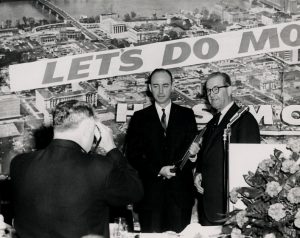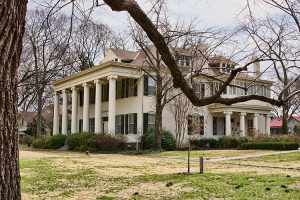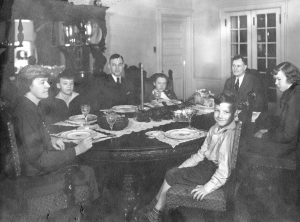calsfoundation@cals.org
William L. Terry Papers Now Open to Researchers
The William L. Terry papers, donated to the CALS Butler Center for Arkansas Studies in 2014, are now available to the public. Consisting of professional working papers, family mementos, photographs, and other items, this collection reveals more than three generations of life in Little Rock for researchers to examine.

Donor William Leake Terry (1922–2016) was an attorney and community leader in Little Rock. His father, David Dickson Terry (1881–1963), was also an attorney and represented Arkansas in the U.S. Congress from 1933 to 1942. William’s mother, Adolphine Fletcher Terry (1882–1976), was active in the Little Rock community and is best remembered for leading efforts to reopen Little Rock’s schools during the desegregation crisis of 1957–1959. William’s uncle, John Gould Fletcher (1886–1950), was a poet and author; he won the Pulitzer Prize for his writing in 1939. William’s grandfather, also named William Leake Terry (1850–1917), was also an attorney; he represented Arkansas in the U.S. Congress from 1891 to 1901. William’s other grandfather, also named John Gould Fletcher (1831–1906), was a businessman who served as mayor of Little Rock from 1875 to 1881. The family lived in the Pike-Fletcher-Terry mansion, built by Albert Pike in 1840, which remains a prominent landmark in Little Rock’s Quapaw Quarter.

The mansion was home to the Fletcher and Terry family for many years; documents ceding the property to the City of Little Rock were created in 1964 and went into effect in 1977 after the death of Adolphine Fletcher Terry. Many of the documents relating to that donation are included in this collection. Also included are legal papers and photographs from the law offices of the elder William Terry and his son, David D. Terry. Material about the David D. Terry Lock and Dam on the Arkansas River in Little Rock is also included, including photographs of the dedication of the lock and dam in 1968. The donor’s activity in the Downtown Little Rock Unlimited, Inc., association of the early 1960s is also part of the collection.

From the elder William Terry’s participation in the Civil War and in Confederate reunions after the war to the establishment of the Arkansas Arts Center Terry House Community Gallery in the Pike-Fletcher-Terry mansion in the 1970s, the city of Little Rock is well represented in this family collection.
The collection can be accessed in the Research Room of the CALS Roberts Library in downtown Little Rock, and the finding aid is available online at http://purl.oclc.org/arstudies/bc-mss-1424.
By Steve Teske, archivist, CALS Butler Center for Arkansas Studies




